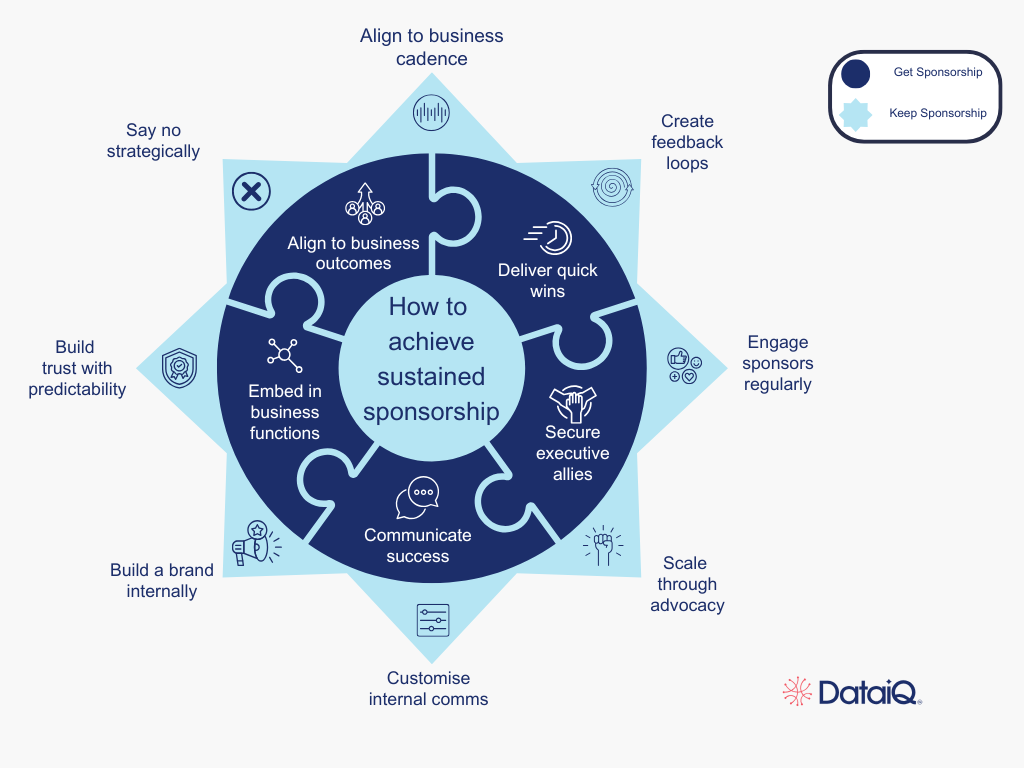Be prepared to say no, strategically and transparently
Winning sponsorship isn’t about saying yes to everything; it’s about protecting strategic focus. The DataIQ 100 stress the importance of discernment and the credibility that comes from it.
Asheeka Singh Hyde, Technology Director – Data, Analytics, and AI at SSP Group, put it bluntly: “Trust can be hard to win, but is easy to lose, so it’s important that you work on keeping that trust. A somewhat counterintuitive learning for me is that saying ‘no’ really helps – so what you do choose to do is high-quality, timely, and valuable work.”
Saying ‘no’ to requests that are not strategically high value is a powerful strategy, and when done transparently, it strengthens the data function’s maturity and credibility. That kind of strategic clarity starts with managing expectations. Gareth Powell, Group Data Officer at Irwin Mitchell, reinforced this: “Ultimately, it is about managing expectations in parallel with a strong value-creation ethic.”
Additionally, for Kendell Timmers, SVP of Data Analytics, Science, and Insights at CNN, internal alignment is a prerequisite for prioritisation: “Unless everybody understands what we are doing, why we do it, what they will get out of it, and when they will see it, it’s impossible to prioritise.”
Chris Miller, CDO at Royal London, described how this shows up in operational practice: “Day to day, we set realistic expectations upfront in our project collaborations, recently strengthening our early-stage gates around change delivery. This investment in defining scope and success criteria up front has been incredibly valuable in helping us to deliver change effectively and build ongoing trust in key relationships.”
Build trust through predictability
Sponsorship thrives on reliability in execution. While impact matters, the DataIQ 100 stress that consistency of delivery is also key to building credibility over time, earning the function a reputation as a dependable infrastructure rather than a wildcard capability. Predictability, in this sense, refers to the reliable delivery of services that are on time, within scope, and aligned with the business rhythm.
Manish Agarwal, Vice President of Data & Analytics at Skechers, described this as a technical commitment: “We maintain a relentless focus on data quality… By consistently meeting these standards, we reinforce trust and credibility with stakeholders, demonstrating our reliability as strategic partners.”
Krish Swamy, Chief Data and Analytics Officer at Citizens Financial Group, pointed to alignment, noting that “Transparency and ongoing dialogue ensure that the business teams trust the data and analytics teams and their initiatives.”
Keep executive sponsors engaged
Securing a sponsor is just the starting line. The DataIQ 100 stressed that ongoing executive support requires visibility, reinforcement and a clear demonstration of value. Karl O’Hanlon, Chief Data & Analytics Officer at Veolia, captured the continuous nature of the work: “We need to continuously enhance both our top-down and bottom-up support… and exponentially increase our data confidence.”
That kind of support is nurtured through regular engagement, structured collaboration, and demonstrated alignment with business goals. Sachin Mistry, VP of Applications and Data Solutions at Ares Management, described a multi-pronged approach: “My approach emphasises regular interactions with senior leadership and periodic presentations to the C-suite, clearly articulating how data initiatives align with broader business strategies and objectives… Additionally, we employ a structured governance model that includes key stakeholders in regular steering committee meetings to ensure ongoing alignment, transparency, and strategic direction… This collaborative and outcome-oriented strategy builds trust and confidence, securing both executive buy-in and active sponsorship for ongoing and future initiatives.”
Customise communication
Many leaders emphasise the importance of tailored, stakeholder-specific communication that not only addresses their pain points but also resonates with their language and tone. Often considered a soft skill, the DataIQ 100 perceive this much more as a practical lever for influence.
Avinash Tripathi, Vice President of Analytics at the University of Phoenix, summed up the approach: “Tailoring our messaging is a cornerstone… we adapt our communication to resonate with each audience.”
Megan Reutin, Global Head of Data Science & Strategy at Grünenthal, brings this to life through tailored storytelling: “I present our data projects with compelling narratives, supported by visuals and real-world examples.” For Andy Moore, CDO at Bentley Motors, this starts with listening: “Understanding the pains/gains/jobs to be done of the stakeholder and offering solutions that are tailored to their outcomes is key.”
Align to business cadence, not data timelines
Timing is everything. Sam Stafford, Chief Digital Officer at LifeSearch, argued that synchronisation with business planning cycles is crucial: “The key… has been to ensure that data is considered at the start of any business initiatives, goals or planning cycle.”
He adds a layer of strategic tension: “The cost conversation will also bring into focus the natural friction between what the business teams would like, and what the technology and data teams can realistically deliver… A healthy tension… will ultimately foster better outcomes in the long run.”
When data teams orient to fiscal calendars and key decision cycles, they’re more likely to shape (not just support) business direction.
Build a brand, not just a function
Beyond one-on-one influence, the DataIQ 100 understand that communication is critical to building the broader reputation of their data teams, often engaging dedicated resources to shape how the function is perceived across the organisation.
For these leaders, branding isn’t fluff; it’s a deliberate act of positioning the data function as a strategic pillar. From stakeholder rituals to visibility at the board level, they’re consistently showcasing wins that build a greater understanding and grow their reputation.
Sanj Jagait, CDO at Arts Council England, puts this in brand terms: “It is vital to be visible across the organisation to develop the ‘brand’ of the Insights team. Openness and transparency about our wins (and where we could have done better, too) help build momentum and credibility.”
Will Gonzalez, Chief Data Officer at NBCUniversal Media Group, reinforced the need for strategic placement: “Reporting directly to the Chairman ensures the strategic importance of the Decision Sciences team.” Craig Day, Chief Data Officer at Barclays Investment Bank, takes a broader approach: “Provide frequent, transparent and relevant communication to stakeholders, showcasing success and value aiding collaboration… and advancing data literacy.”
Sudharshan Ravi, VP and Head of Data at Volvo Penta, reinforces the visibility principle: “Advertise, communicate, demonstrate… If people do not see, hear or understand the success… it might as well not exist.”
Embed feedback into the model
The DataIQ 100 view feedback as a strategic infrastructure rather than mere formality. By embedding structured, recurring mechanisms for stakeholder input, these leaders find that their sponsorship is elevated from passive support to active partnership. Anu Bedi, Senior Director of Measurement Insights Data & Analytics at LinkedIn, champions this strategy: “To maintain momentum and build trust, I employ a continuous testing and validation approach, sharing the results and quantifiable value generated with stakeholders.”
Some set up structured sessions with business units to hear what is working and what is not. Others build feedback into product cycles. This strategy goes beyond delivery refinement, making stakeholders feel seen, involved and invested.
Ankit Goel, Chief Data & Analytics Officer at KeyBank, summed up the cultural imperative: “Ensuring a consistent opportunity for information to flow and allowing for feedback and discussion on potential options is crucial.”
Scale through advocacy
Lastly, the DataIQ 100 are going beyond executive relationships to create grassroots traction. They’re seeding data advocates into business units: allies who can amplify the function’s relevance.
Karl O’Hanlon described this as part of Veolia’s long-term vision: “Developing a network of data ambassadors across the organisation to exponentially increase our data confidence.” These ambassadors become translators, trust-builders, and distributed influencers, essential for scaling sponsorship beyond a single sponsor.

What gets you in the room may not keep you there
The foundational strategies—aligning with business goals, proving value early, embedding within functions, and sharing success—are still the price of entry.
However, the tactics above are what sustain sponsorship in complex and shifting environments.
They’re less visible. Less often shared. But they matter deeply to the data and AI leaders who not only get business support but also keep it.
Coming next
This article is part of a new series based on insights from the DataIQ 100: the most influential data and AI leaders across Europe and North America. Next, we will explore the subtle but important differences in how sponsorship is earned and sustained in each region. The goal is to help senior leaders refine their approaches by observing what works in various environments, particularly when navigating global teams or building influence across borders.
Join the DataIQ 100 – and stand alongside the industry’s most influential voices.
If you’re leading change in data and AI, it’s time to make it visible. The DataIQ 100 is the first and only fully curated power list of the most influential data and AI leaders, who are shaping strategy, culture, and impact across Europe and North America.
Apply now to be considered for the DataIQ 100 2026 and share your story and impact with the leaders defining what excellence looks like.
Ready to lead the conversation? Register your details here.
Join the premier gathering for data and AI leaders at the DataIQ World Congress, 4–5 November. This is where the real conversations happen with people who are making the difference. Find yourself among peers who are shaping strategy, influencing investment, and delivering outcomes driven by data and AI. Celebrate the best at the DataIQ Awards and contribute to the collective momentum of data leadership. Get your World Congress tickets now.





